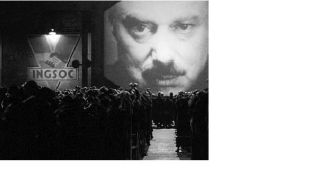Directed by British filmmaker Michael Radford, “Nineteen Eighty-Four” — the second film adaptation of the famous George Orwell novel — is set during April 1984 in post-atomic war London, the capital city of the repressive totalitarian state of Oceania, ruled over by dictator Big Brother. Oceania is permanently at war, though the opponent changes from Eurasia to Eastasia and back again. Tele-screens watch your every move and pump out propaganda 24 hours a day.
In this movie released, appropriately enough, in 1984, Winston Smith (John Hurt) is a government bureaucrat whose job is rewriting history and erasing people from existence. While his coworker Parsons (Gregor Fisher) seems content to follow the state’s laws, Winston starts to write in a secret diary despite the fact the “Big Brother” is watching everyone at all times by way of monitors. He silently suffers and tries to comprehend his oppression, which forbids individual human behaviors such as free thinking and sex. He meets Julia (Suzanna Hamilton), who works for the Ministry of Truth, and they engage in a stoic love affair. They are soon found out, and Winston is interrogated and tortured by his former friend O’Brien (Richard Burton in his final film appearance).
George Orwell wanted to call his final novel “Nineteen Forty-Eight,” after the year in which he wrote it, but his publisher vetoed that. So Orwell reversed the last two digits of the year. Hence the title, which, along with other phrases from the book (Big Brother, Newspeak, Room 101) have become terms used even today. Whether “1984” is Orwell’s best novel is a matter of opinion; some people no doubt prefer the novella-length allegorical fable “Animal Farm,” others the earlier comic novels (one of which, “Keep the Aspidistra Flying,” has been filmed).
There’s little doubt, however, that “Nineteen Eighty-Four” (along with “Animal Farm”) is Orwell’s most influential work and the one on which his reputation is likely to stand — and little wonder that it’s been made into a movie more than once.
Nigel Kneale first adapted it for the BBC in 1954 for a live-broadcast version starring Peter Cushing (one of the earliest British TV productions to survive as a film recording) — triggering controversy at the time for what critics called its “sadistic” content. That version was released on DVD in November 2004. Michael Anderson directed a feature-film version in 1956 that is hard to see nowadays; rather like the 1954 Halas and Batchelor animated film of “Animal Farm,” this version of the book twisted Orwell’s message by giving the story an upbeat ending.
So when the year 1984 rolled around, there was, not surprisingly, much interest in Orwell and his work — thus culminating in the production of a new film version of the famous novel. And, like the book, the film spells out its title in words rather than in digits. Once the year was over, there was a sense that the novel had passed its sell-by date, which has caused Michael Radford’s film to be somewhat undervalued. But science fiction does not usually mean to prophesy. “Nineteen Eighty-Four,” along with Aldous Huxley’s almost as influential “Brave New World,” belongs to the part of the genre that sets out to warn.
In many ways it has been prescient: the “proles” kept pacified by a diet of smut and junk TV (dealt with more in the novel than the film), the use of language to slant truth and meaning and the dangers of dictatorship. The novel remains as relevant as it ever did, and Radford’s film deserves re-evaluation.
Natalie Sheard is the owner of Café Luna.



